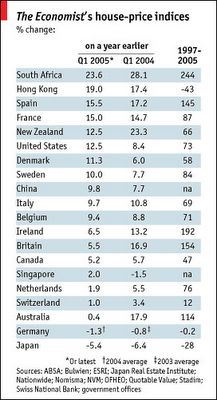The Economist is also fretting about housing (as it has been for some time now).
One other big difference between houses and shares is more cause for concern than comfort: people are much more likely to borrow to buy a house than to buy shares. In most countries, the recent surge in house prices has gone hand-in-hand with a much larger jump in household debt than in previous booms. Not only are new buyers taking out bigger mortgages, but existing owners have increased their mortgages to turn capital gains into cash which they can spend. As a result of such borrowing, housing booms tend to be more dangerous than stockmarket bubbles, and are often followed by periods of prolonged economic weakness. A study by the IMF found that output losses after house-price busts in rich countries have, on average, been twice as large as those after stockmarket crashes, and usually result in a recession.
The Economist also publishes a global house price index, here is the latest version.

Apart from the fact that the boom in the Netherlands, the UK and Australia has now clearly broken, note the performance in key ageing economies like Germany and Japan, where property values have been falling for some time now, and Switzerland, where they are about to. One other surprising detail is Italy, where y-o-y is still at 9.7% despite the protracted recession. Just watch what happens when it follows the 'ageing' trajectory. (Spain will too, in my opinion, but that is out there in the future , and another story).











3 comments:
In a functional housing market this doesn't have to be problem. There's been a structural slowdown in the construction of the Dutch housing market for years.
Building societies (is that the right word for "woningbouw vereniging"?) and real estate developers have chosen to build high value/high quality housing instead. Despite many complaints this structural shortage seems set to go on for a few years more. It will help prevent a crash in house prices.
Question is, will the market system function as well in other countries?
Hi, both of you. I think Frans is right on the terminology,and on the slowdown captvk is probably right, you have slowed down rather than crashed. On whether this is producing a shortage of housing for less affluent people, I pass.
Incidentally you also seemed to slowdown rather than crash on fertility in the netherlands, if I am not mistaken.
Frans,
Is the market working? Yes, thanks to a bit of accident (local&government regulations) but also by design (going for more expensive and high quality housing). There's a small structural deficit on the housing market and we should be glad for it because (sofar) we've managed a soft landing.
The less affluent may not get the best deal out of this but even if the market did build more low income housing most of those would be bought by couples/families with mid-high incomes. They would always be able to offer more.
Edward,
Actually slightly on the rise in the last few years. We dangled at the 1.5 border around 1982 but since then the trend is rising in the right direction.
Post a Comment